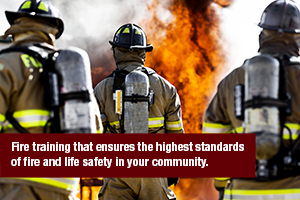Fire Inspector
Fire Inspector: Principles and Practice is a cutting-edge online training program offered in partnership by FireRescue1 Academy and Jones and Bartlett Learning. This program provides an engaging learning experience for students taking Fire Inspector level courses. It is important for fire inspectors to know how to interpret and apply national and local codes and standards in the office and also in the field.
Fire Inspector: Principles and Practice is designed to prepare fire inspectors and ensure they set the highest standards of fire and life safety in their communities. This training program meets and exceeds the job performance requirements for level I and II fire inspectors from Chapters 4 and 5 of NFPA 1031, Standard for Professional Qualifications for Fire Inspector and Plan Examiner, 2014 Edition.

| Course Name | Course Description | Length |
|---|---|---|
| Module 1: Inspector Authority – How to Become a Fire Inspector | Training to become a firefighter is challenging. By the time you complete this course, you’ll be well equipped to continue a centuries-old tradition of preserving lives and property threatened by fires. You’ll have an understanding of the many duties and responsibilities of the fire service, and you should have a feeling of personal satisfaction about your accomplishment. | 45m |
| Module 2: Building Construction | The Building Construction module of the Fire Inspector course discusses building materials, building construction types, occupancies, the code enforcement structure as adopted by the Authority Having Jurisdiction and governed by NFPA and the International Fire Code (IFC), and how they relate to a building inspection. | 3h 30m |
| Module 3: Occupancy Loads and Means of Egress | The Occupancy Loads and Means of Egress module of the Fire Inspector course discusses the relationship between occupancy loads and appropriate means of egress. This module looks at occupancy load calculations and the various components of means of egress such as doors, stairs, ramps, passageways, exit discharge, etc. that must be factored in to determine the same egress plan. | 1h 30m |
| Module 4: Fire Detection and Alarm Systems | The Fire Alarm and Detection Systems module of the Fire Inspector course discusses the components of a fire detection and alarm system, the classes, use, & operation of fire alarm systems, occupancy requirements, the inspection and testing of detection and signaling systems, and how they relate to a building inspection. | 3h |
| Module 5: Water Supply and Fire Flows | The Water Supply and Fire Flows module of the Fire Inspector course discusses the design, components, resources, and distribution employed to develop fire department water supplies and the use and testing of the fire hydrant to develop available fire flows at a given structure or area of the water system. These are all important elements for the fire inspector. | 2h 30m |
| Module 6: Fire Suppression Systems | The Fire Suppression Systems module of the Fire Inspector course discusses the various types of fire extinguishing sprinkler systems, components, installation, their operation, and how they relate to a building inspection. | 2h |
| Module 7: Fire Growth and Spread Factors | The Fire Growth and Spread Factors module of the Fire Inspector course discuss the factors which both affect and restrict fire growth and spread. The factors include fire resistance and fire and flame spread ratings, fire loads, roof coverings, firewalls and partitions, fire doors, fire and smoke dampers, smoke and heat ventilation systems, and how all these relate to a building inspection. | 2h |
| Module 8: Hazardous Materials Awareness | The Hazardous Materials module of the Fire Inspector course covers in some detail the nine Haz-Mat Classifications that form the basis of the codes that regulate them. The risk to the public, Haz-Mat vendors, and first responders associated with Hazardous Materials reflects its comprehensiveness: there is a lot to know. The Fire Inspector must have a well-rounded knowledge of hazardous materials, their handling, storage, transportation, and display. | 2h |
| Module 9: Fire Hazard Recognition | The Fire Hazard Recognition module of the Fire Inspector course emphasizes the Inspector’s ability, once he or she has become familiar with the categories of prevention, to anticipate a situation that may develop into something dangerous from recognizing the hazards that are presented. Much of this centers around traditional fire prevention violation areas: poor housekeeping, ignition sources, careless use of flammable and combustible liquids, open burning, and improper use of electricity. | 1h 30m |
| Module 10: Emergency Planning and Preparedness Procedures | The Emergency Planning and Preparedness Procedures module of the Fire Inspector course discusses approach and access to a building or structure by firefighters, interior building factors relating to movement inside and egress from the building for firefighters and occupants, and the development of emergency evacuation plans, and NFPA and IFC evacuation plan and drill requirements, all of which relate to a building inspection. | 1h 30m |
